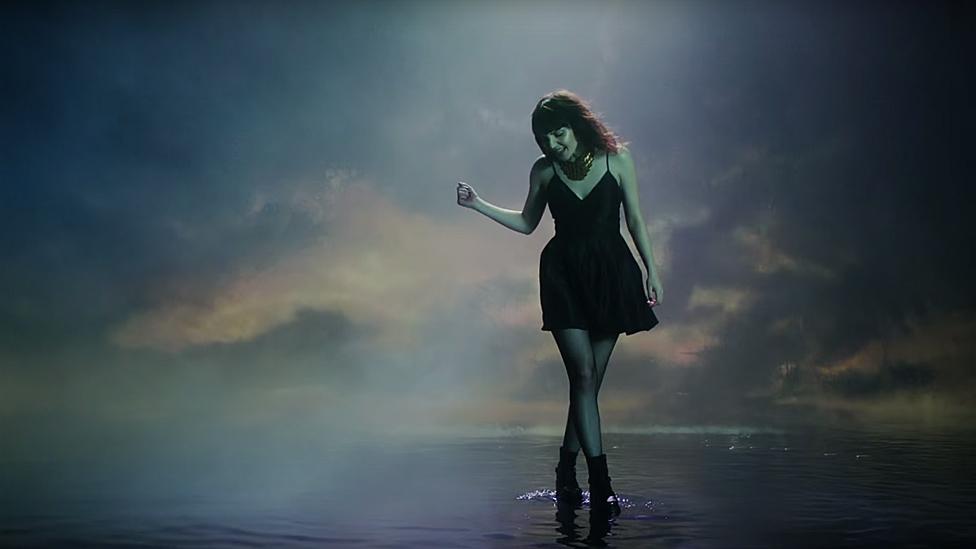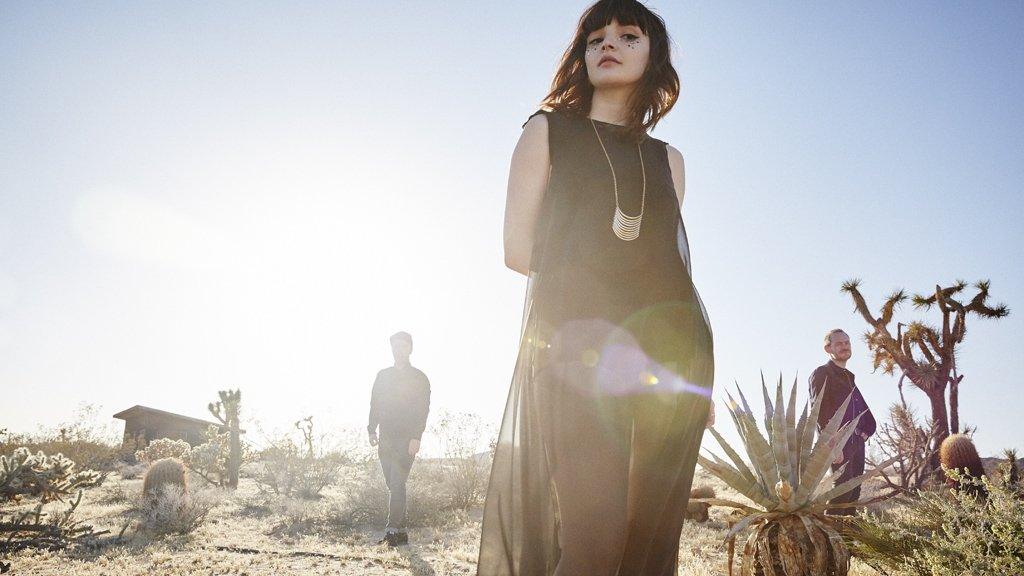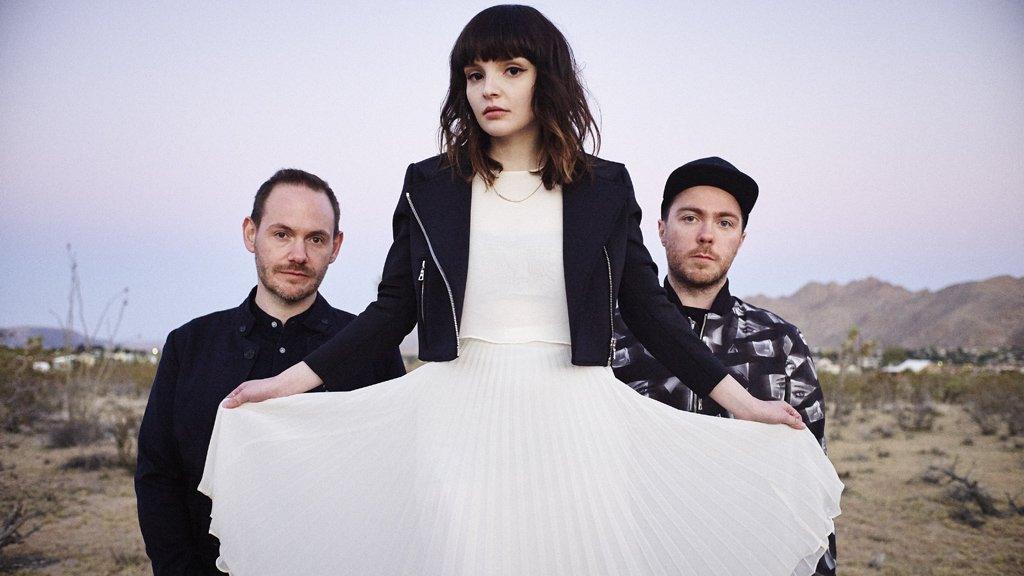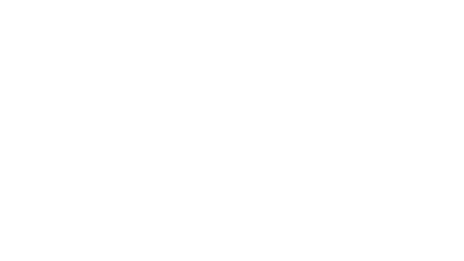Chvrches interview: 'We won't live in fear'
- Published
Glaswegian synth-pop band Chvrches discuss the recording of their new album, stage fright, and dealing with misogynist abuse.

Chvrches (L-R): Martin Doherty, Lauren Mayberry, Iain Cook
Many people will know Chvrches not for their tempestuous synth-pop, but for the vicious abuse targeted at singer Lauren Mayberry.
The frontwoman has repeatedly spoken out about the sickening, sexually aggressive messages she receives on a daily basis. But things reached a new peak in August, when the band released their new single, Leave A Trace, external.
Apparently, Mayberry's appearance in the video - she wore a dress - was proof that her views on the objectification of women were "hypocritical". The 27-year-old was subsequently sent messages calling her a "slut", a "whore" and a "bitch".
She made a robust response - calling the anonymous writers "cavemen" and describing their threats as "sadly predictable" - but when we speak, the singer is still feeling "tender" from the attacks, and the media frenzy that followed.
Would she rather not discuss the topic, I wonder? Does acknowledging the trolls simply encourage them?
Mayberry bristles at the suggestion.
"We probably get more trolls now because people think we painted a target on our backs," she says. "But I can hand-on-heart tell you that people said as much misogynist crap when I was wearing shorts and a t-shirt and 95 denier tights as they do when I am in a video wearing a dress.
"You could be standing there wearing a boiler suit and people are still going to do it because they don't think there should be a woman in that position.

The "hypocritical" video for Leave A Trace has been watched more than 2.2 million times
"They don't send those messages to you for a giggle. They send them to scare and intimidate you. If I was like, 'It's ok, I'll just walk away,' it doesn't change anything. You're condoning it by being silent.
"If you don't like the record, cool. Everyone is entitled to their opinion. But there is a difference between criticising the work and discussing someone's tit size or whether they give oral sex.
"There is a line, I think."
Mutual respect
Success has come with major downsides, but Chvrches haven't let it affect them. When we meet to discuss their second album, Every Open Eye, in London, the trio display a camaraderie and mutual respect that simply isn't present in other bands.
"That's because it's early in the promo," says Mayberry, laughing. But the reality is that the support of her bandmates, Iain Cook and Martin Doherty, has been crucial to her sanity (and vice versa) since they were thrust, blinking, into the limelight two years ago.
There's even a song about it on the new record. "We are made of our longest days / We are falling but not alone," sings Mayberry on Make Them Gold.
"There have been great things, and a lot of things that aren't so great," she says, "but it's always nice to know that we are coming at it from a united standpoint.
"Totes emosh, right?"
Doherty jokes that the band's Scottish roots keep them level-headed.
"Nothing will ground you like a weekend at home in Glasgow," he grins. "If you've just been swanning about in California, you can go home and shout, 'I'm back!' but everyone else is like, 'Yeah? So what? I have to go to work.'"
"Nobody has got £12 to spend on a juice there, have they?" says Mayberry, adopting a thick Glaswegian brogue: "'What d'ye mean this juice was crushed by air? Just squeeze the fruit intae a cup for us.'"

The band have contributed tracks to the Hunger Games: Mockingjay and Drive (Rescore) soundtracks since the success of their first album
'Chasing our tail'
Chvrches began almost by accident. Doherty and Cook had known each other for years, playing in guitar bands the Twilight Sad and Aereogramme respectively. When the latter split up, they began writing together, swapping guitars for sawtooth synths and walloping drum patterns.
Cook then asked Mayberry - whose band, Blue Sky Archives, he was producing - to sing on the demos. The sessions went so well, they formed their own group, calling it Chvrches (the Roman "v" making it easier to Google.)
Their first two singles, Lies and The Mother We Share, blew up online and earned the trio a place on the BBC's Sound of 2013. They were signed to Virgin shortly afterwards, selling half-a-million copies of their debut album, The Bones Of What You Believe.
The success was head-spinning - but it made the group determined to improve.
"Whether we expected to be here or not, we are a professional band now," says Mayberry. "Every time I go through customs, I write down professional singer as my employment. So I said, 'I need to change the way I look at this. I don't want to be constantly feeling like I'm chasing my tail."
Preparing for album number two, the group resisted the temptation to employ big-name pop producers and co-writers.
"People don't make albums any more," Cook theorises. "They make 11, 12 songs, and they put them out as an album but they feel like a greatest hits, or a playlist."
"It's a regurgitation of whatever cool counter-culture is going on," Doherty adds. "It's like, 'We've got the rap one, we've got the house one, we've got the R&B banger.'"
"And maybe out of those 10 or 11 songs, those co-writes that you do, there's a global number one. But it's not yours.
"So we took some steps to try and recapture where we were at before any of [the success] happened. We went back to Glasgow, we made the record in the same studio, we wrote every note ourselves."

Mayberry says she has grown in confidence, after "hiding behind a tambourine" in the band's early live shows
Going in, the band were anxious their song-writing muscles might have wasted away after two years on the road. But "it was like turning a tap on," says Doherty.
"I don't remember the first two months of recording, because every day was like bang, bang, bang, bang, bang. After two months we had gone from nothing to 20-ish tunes."
Only one song, Afterglow, eluded them. It was vetoed time and time again, a victim of the band's democratic approach. But Doherty couldn't let it go.
"We all have a great relationship but we fell out over that song for about six weeks," he says, grimly.
"We really butted heads" Mayberry agrees."I was like, 'get away from me with that trance beat.'"
But on the last day of recording, the band pulled it off the shelf and "ripped it apart" - slowing it down, deleting the drum track and re-recording the vocals.
"It's the one song on the album that's a once-through vocal," Mayberry says. "And it's weird how much noise you make... All these swallowing, breathing sounds. There's a bit where you can hear the radiator clinking!
"But I like that - all those things give it personality. There's a lot of vocals you hear on the radio that don't have any character. I'll think, 'You're singing in a way that makes it seem you are super-emotional, but you've auto-tuned all the character out of it and I don't believe what you're saying."
Witnessing Lauren's performance on Afterglow "actually made me quite emotional," says Doherty. "And we were like 'right, that's closing the record.'
"It went from the bin to one of the most important pieces of music on the album."
"It sounds like our band - but in a way that people might not expect," Mayberry agrees. "The record wouldn't be the same without it."

"It sounds to me like we have a more assured idea of what the band is, having lived in it for two years," says Mayberry
Across the new album, Mayberry's vocals are at the forefront - conveying anger, compromise, triumph, fragility, melancholy and strength. Her lyrics, too, are more assertive (Leave A Trace, in particular, is as scathing as pop songs come).
Back in 2012, Mayberry told the BBC she was "still finding her feet" as a singer. Now, it seems, she has emerged as a fully-fledged frontwoman.
"I wrestled with it in different ways in different times," she says. "I spent a certain amount of time being so uncomfortable with it, and wanting to make myself smaller and smaller and just be left alone.
"So I think it was helpful to have some time off to think, 'Well, this is my life. Do I want to constantly dress in a baggy t-shirt so that people leave me alone?'
"And I was like, 'No - because you're making those decisions out of fear' and I don't feel that that, psychologically, is a good way to live your life.'
"So, I'm all zen now."
Chvrches' second album, Every Open Eye, is out now.
- Published28 August 2015

- Published31 December 2012
